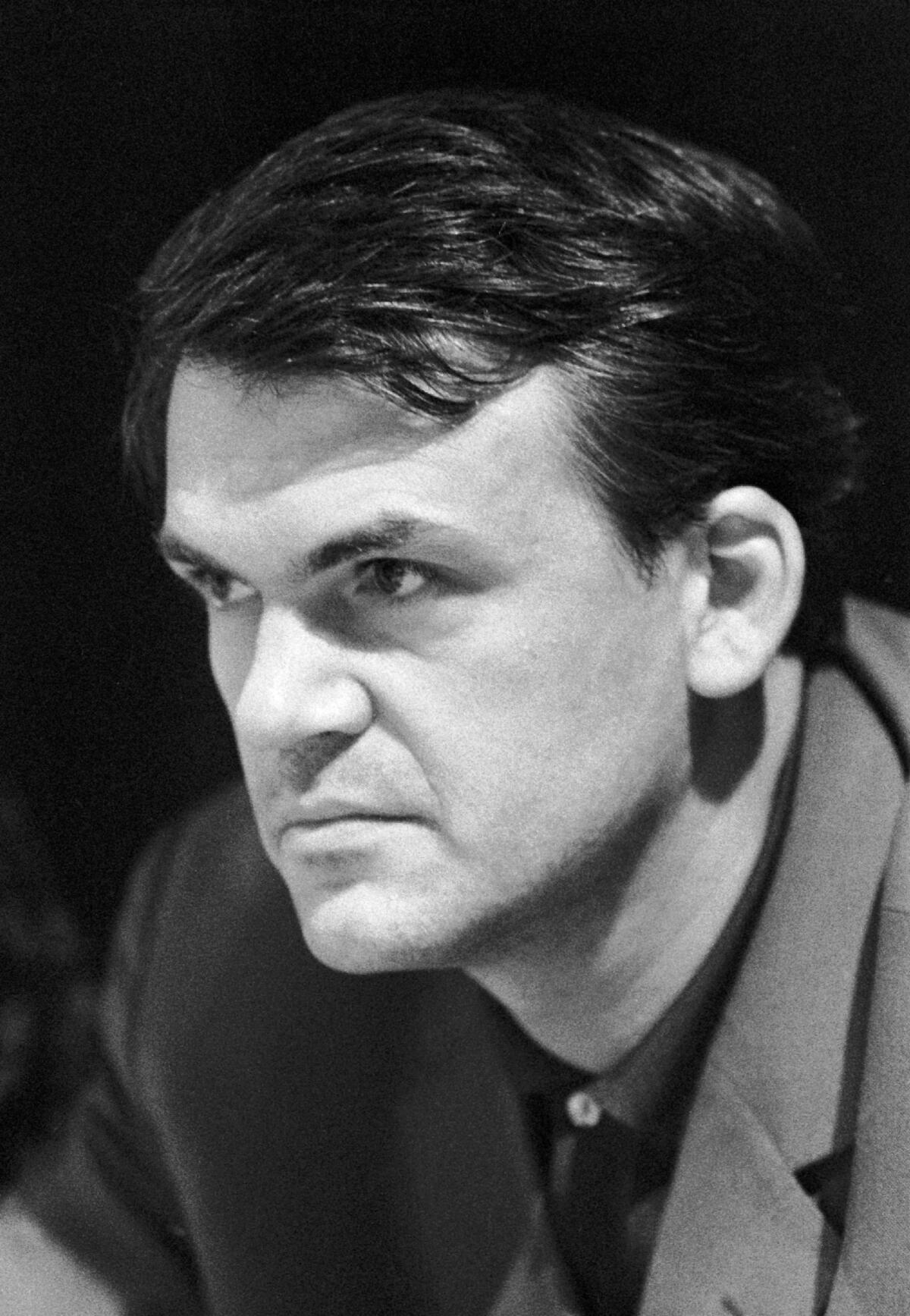Milan Kundera, Czech novelist known for ‘The Unbearable Lightness of Being,’ dies

The award-winning Czech author Milan Kundera, whose legacy includes the novels “The Unbearable Lightness of Being” and “The Festival of Insignificance,” has died in Paris. He was 94.
The French publishing house Gallimard announced Kundera’s death Tuesday, according to the Associated Press. The Gallimard website featured a banner of Kundera with the years of his birth and death.
“Milan Kundera was a writer who was able to reach generations of readers across all continents with his work and achieved world fame...,” Petr Fiala, prime minister of the Czech Republic, said in a Wednesday tweet translated from Czech. “He left behind not only a remarkable work of fiction, but also an important work of essays.”
Milan Kundera, the author best known for “The Unbearable Lightness of Being,” has a new novel coming in English, the first in more than decade, the Guardian reports.
Born in 1929 in what was then Czechoslovakia, Kundera was known for intertwining erotic tones with anti-Soviet sentiment in short stories, essays and poems. His most popular work, 1984’s “The Unbearable Lightness of Being,” best exemplified his approach to literature — weaving themes of love, politics and exile into a novel that would earn him critical acclaim among his literary community.
Set in the late ’60s and early ’70s, “The Unbearable Lightness of Being” details the lasting effect of the Soviet-led invasion of the country in 1968 through the lives of four Czech citizens. In 1985, Kundera and his novel won the Jerusalem Prize for literature, a biennial award given to writers whose work exemplifies the freedom of the individual.
The excellence of “The Unbearable Lightness of Being” transcended mediums. Four years later, Kundera’s novel was adapted into Philip Kaufman’s film of the same name; it starred Daniel Day-Lewis, Juliette Binoche and Lena Olin. The movie received two Oscar nominations in 1989, including for adapted screenplay.
There’s not much to Milan Kundera’s 10th novel, “The Festival of Insignificance” — his first work of fiction since 2000’s “Ignorance” — but then that’s part of the point.
Kundera, son of musicologist Ludvík Kundera, had a complicated relationship with his home country’s communist history, which would affect the reach of his works. An on again-off again member of the Communist Party of Czechoslovakia, Kundera published his first novel, “The Joke,” in 1967. “The Joke,” which starts off following a young man dispatched to the mines for poking fun at communist slogans, was — like a number of Kundera’s works — banned in Czechoslovakia after the Soviet invasion in 1968.
Around the same time, he lost his job as a professor of cinema in his home country. In 1975, Kundera started anew in France with his wife, Věra, taking up a teaching position at the University of Rennes. Having been stripped of his Czech citizenship, he became a naturalized French citizen in 1981. (His Czech citizenship was restored in 2019.)
Kundera continued writing novels, including “Immortality,” “Identity” and “Ignorance,” which were published in French. He released his final book, “The Festival of Insignificance,” in 2015. In his later years, Kundera allowed the translation into Czech of his French-language works.
In 2008, the author was at the center of a controversy prompted by a report from the Czech Republic’s Institute for the Study of Totalitarian Regimes, alleging that when he was a 21-year-old student, he informed secret police about someone in his dormitory. The man Kundera allegedly reported was convicted of espionage and sentenced to hard labor for 22 years.
IDENTITY: A Novel. By Milan Kundera . Translated from the French by Linda Asher (HarperCollins: 168 pp., $22) ; FAREWELL WALTZ: A Novel. By Milan Kundera . Translated from the French by Aaron Asher (HarperCollins: 278 pp., $12.50)
Kundera denied the allegation.
Kundera rarely spoke to the media and often refused to appear on camera. In a 2012 speech at the National Library of France, the author said he would not allow digital copies of his writing to be published and criticized the state of literature in a tech-driven world.
“For several years now, I have in all my contracts a clause stipulating that [my works] must be published only in the traditional form of a book, that they be read only on paper and not on a screen,” he said. “People walk in the street, they no longer have contact with those around them, they don’t even see the homes they pass, they have wires hanging from their ears. They gesticulate, they should, they look at no one and no one looks at them. I ask myself, ‘Do they even read books anymore?’ It’s possible, but for how much longer?”
Now, however, ebook versions of “The Unbearable Lightness of Being” and myriad other Kundera books are widely available.
In 2021, Kundera donated his private library and archive to the public library in his hometown of Brno in the Czech Republic. Donated items include editions of his works in Czech and 40 other languages, newspaper clippings, his drawings and reviews of his work.
In a rare interview with the Paris Review in 1983, Kundera said “a novel is a meditation on existence, seen through imaginary characters.”
“The form is unlimited freedom,” he added. “Throughout its history, the novel has never known how to take advantage of its endless possibilities. It missed its chance.”
The Associated Press contributed to this report.
More to Read
Sign up for our Book Club newsletter
Get the latest news, events and more from the Los Angeles Times Book Club, and help us get L.A. reading and talking.
You may occasionally receive promotional content from the Los Angeles Times.








